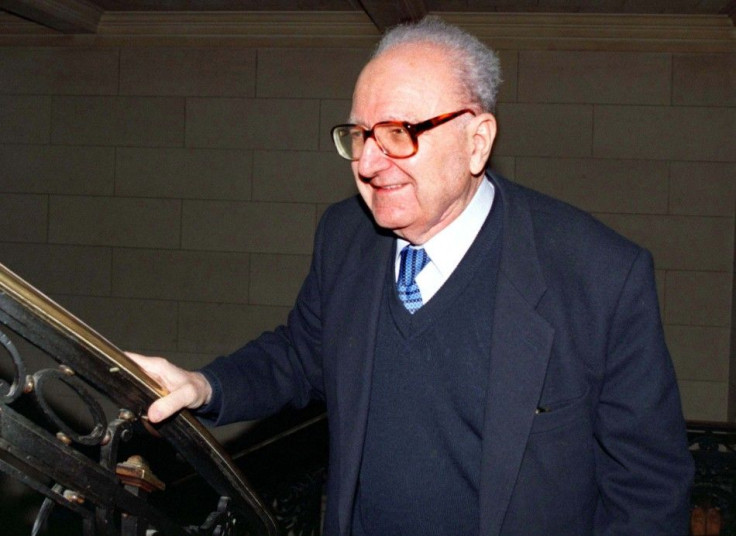Roger Garaudy, Communist, Christian, Philosopher, Holocaust Denier, Dies At 98

Roger Garaudy, one of the most controversial Frenchmen of the twentieth century, has died at the age of 98, in the Paris suburb of Chennevieres.
Over his near-century-long existence, Garaudy embraced a bewildering variety of ideologies and philosophies, but he will most likely be remembered for denying the Nazi holocaust -- a position that endeared him to much of the Islamic world.
In 1996, the philosopher/author published a book entitled “The Founding Myths of Israeli Politics.” Among other accusations, the text claimed that the mass murder of Jews by Nazis was a “myth” invented by the Western allies (UK, France, U.S.) as a pretext to occupy Germany. He was subsequently convicted of holocaust denial (a serious crime in France) and received a suspended jail sentence of several years and fined 240,000 francs.
The book “Founding Myths” was particularly critical of what Garaudy viewed as excessive Jewish influence on U.S. foreign policy.
But there was much more to this man than just denying the existence of Nazi gas chambers -- indeed, his life traversed an epic and meandering course that might have been unprecedented.
Born to a Catholic family in Marseille in the south of France in 1913, he later converted to Protestantism, then returned to the Catholic Church, before finally converting to Islam in old age.
Politically, he joined the French Communist Party after World War II, when he fought for the resistance against Germany. He was held as a prisoner of war in Algeria by the Nazi collaborationist Vichy regime. In the late 1940s and 1950s, he served in government as a parliamentarian and a senator for the communists.
By 1970, however, the communists expelled him from the party after he had publicly criticized the Soviet Union’s 1968 invasion of Czechoslovakia. (Ironically, he had defended the Soviet invasion of Hungary a dozen years prior).
However, he maintained his opposition to capitalism throughout his whole life. Within the Communist Party, he was known as the Cardinal due to his attachment to the church.
On the whole, Garaudy penned about 70 books, principally on Marxism and political philosophies.
Garaudy long enjoyed the admiration of France’s intellectual and media elite -- until his conversion to Islam in 1982 and his increasingly aggressive anti-Semitism, which culminated in the publication of his anti-Zionist book which landed him in the courts.
Of course, leaders in the Arab and Muslim world embraced him.
Hassan Nasrallah, the chief of the Hezbollah movement in Lebanon, hailed Garaudy, while Moammar Gaddafi of Libya awarded him with a human rights prize in 2002.
Gaddafi reportedly characterized Garaudy as Europe's “greatest philosopher since Plato and Aristotle.”
The Islamic republic of Iran defended him and warmly embraced him during a visit to Tehran.
In recent years, he claimed that the 9/11 attacks in the U.S. were perpetrated by the Bush administration in order to launch wars in Afghanistan and later Iraq.
Richard Prasquier, the head of the Representative Council of French Jewish Institutions, traced Garaudy’s spectacular downfall.
[Garaudy] ended up pitifully on an intellectual level, with the lowest kind of revisionism. Historians will one day look at his ideological drifting that turned him one of the best-known revisionists, he said.
© Copyright IBTimes 2025. All rights reserved.





















